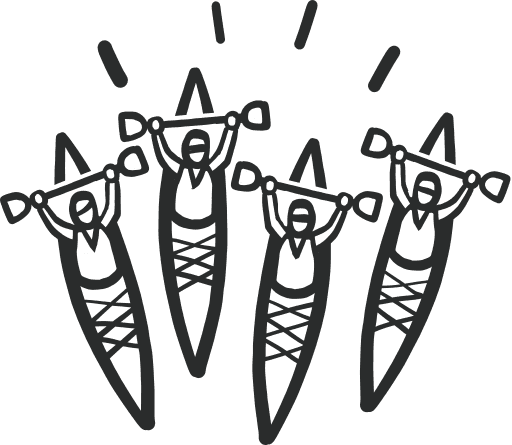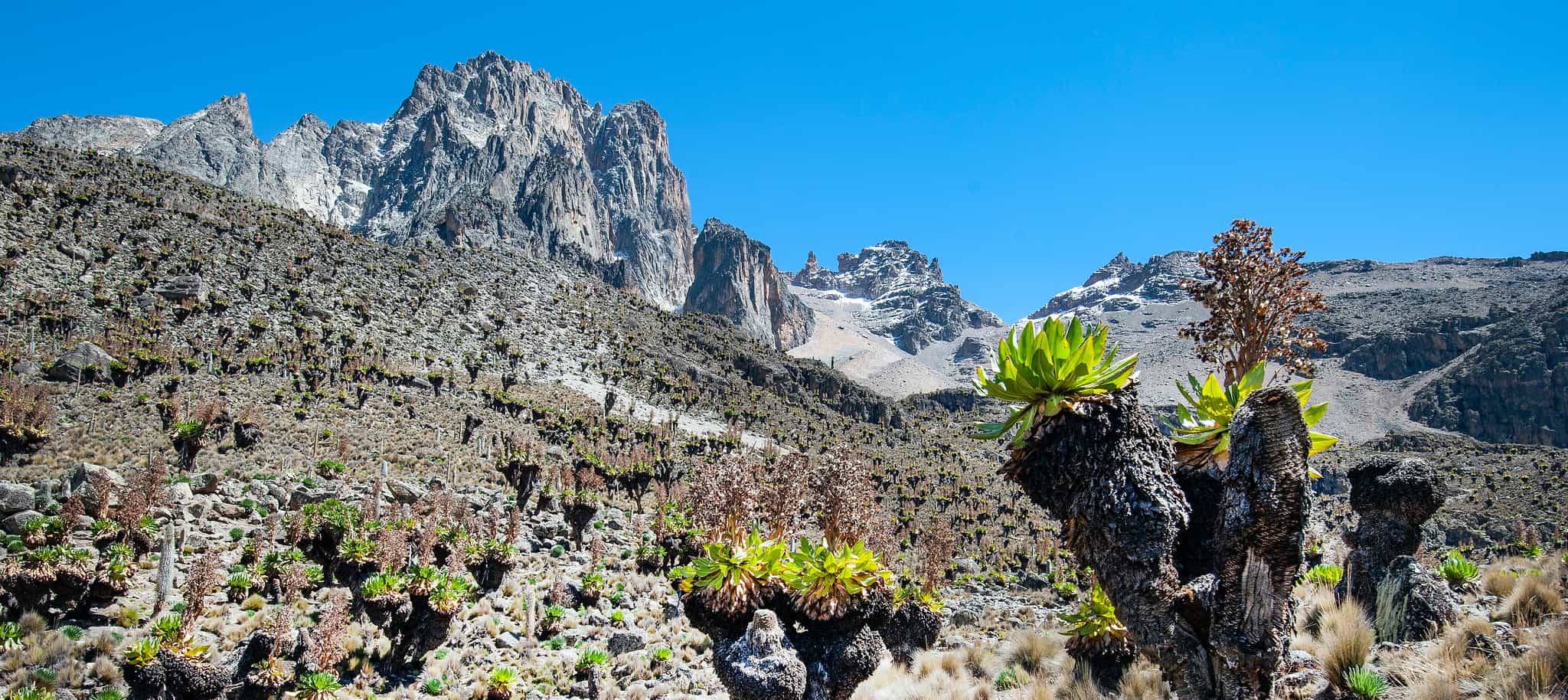
Climb Mount Kenya (4985m)
Trek your way up Africa's second highest mountain via the scenic Sirimon route
What's Included?
Small Like-minded Groups
Solo-friendly by design, join our small n’ sociable groups of up to 14 like-minded, active and outdoorsy people…
…
What's it like?

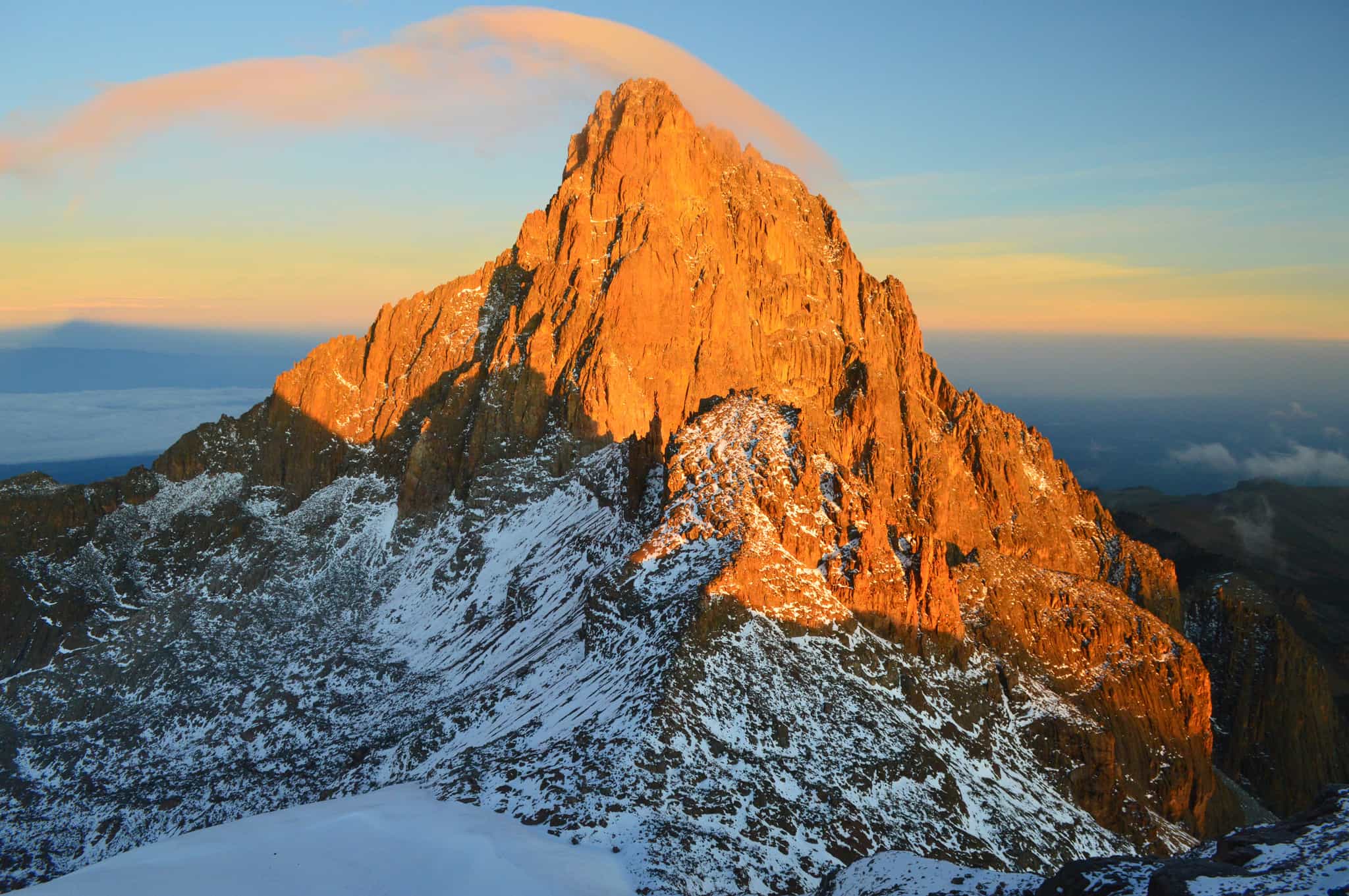
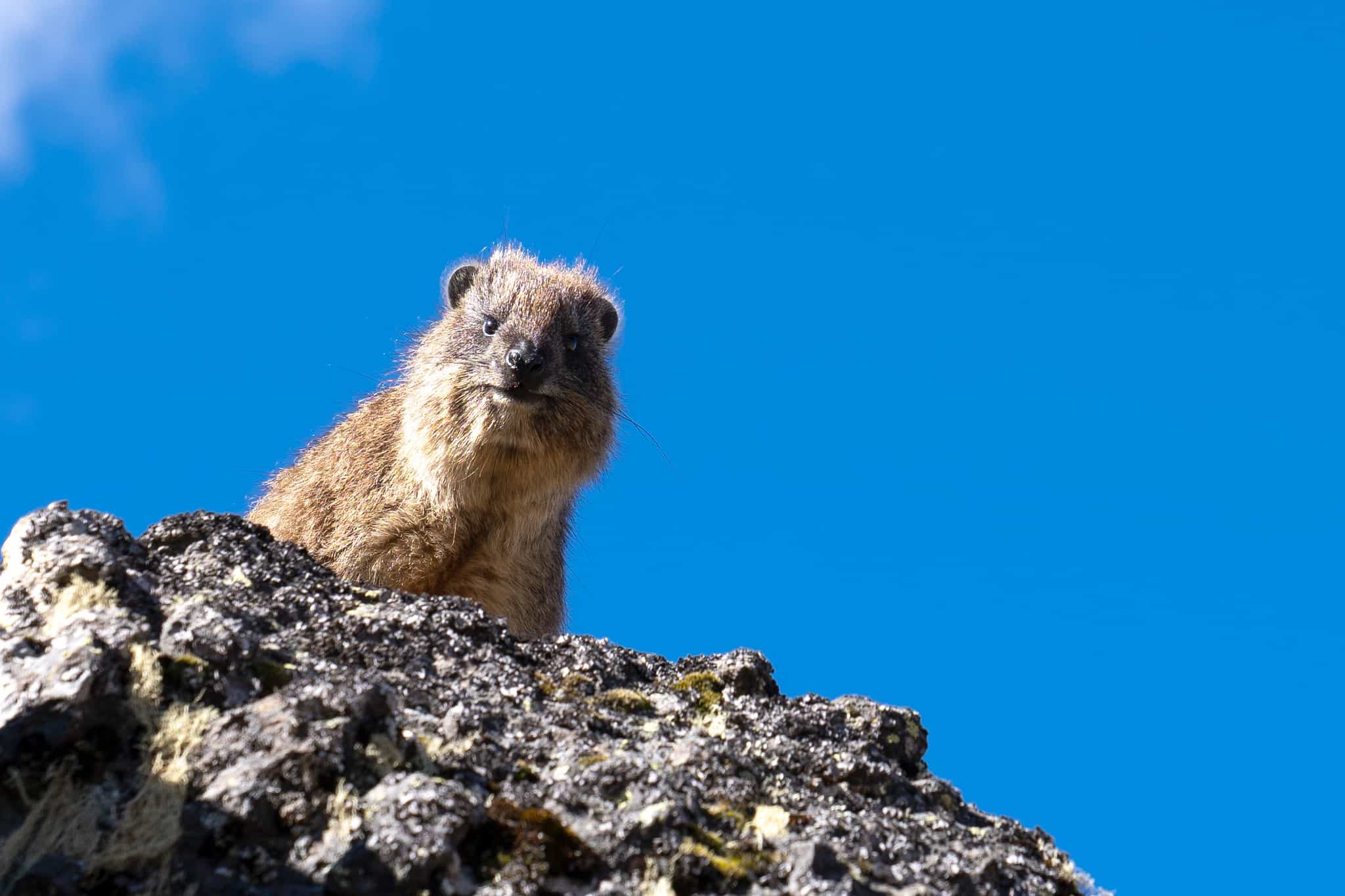
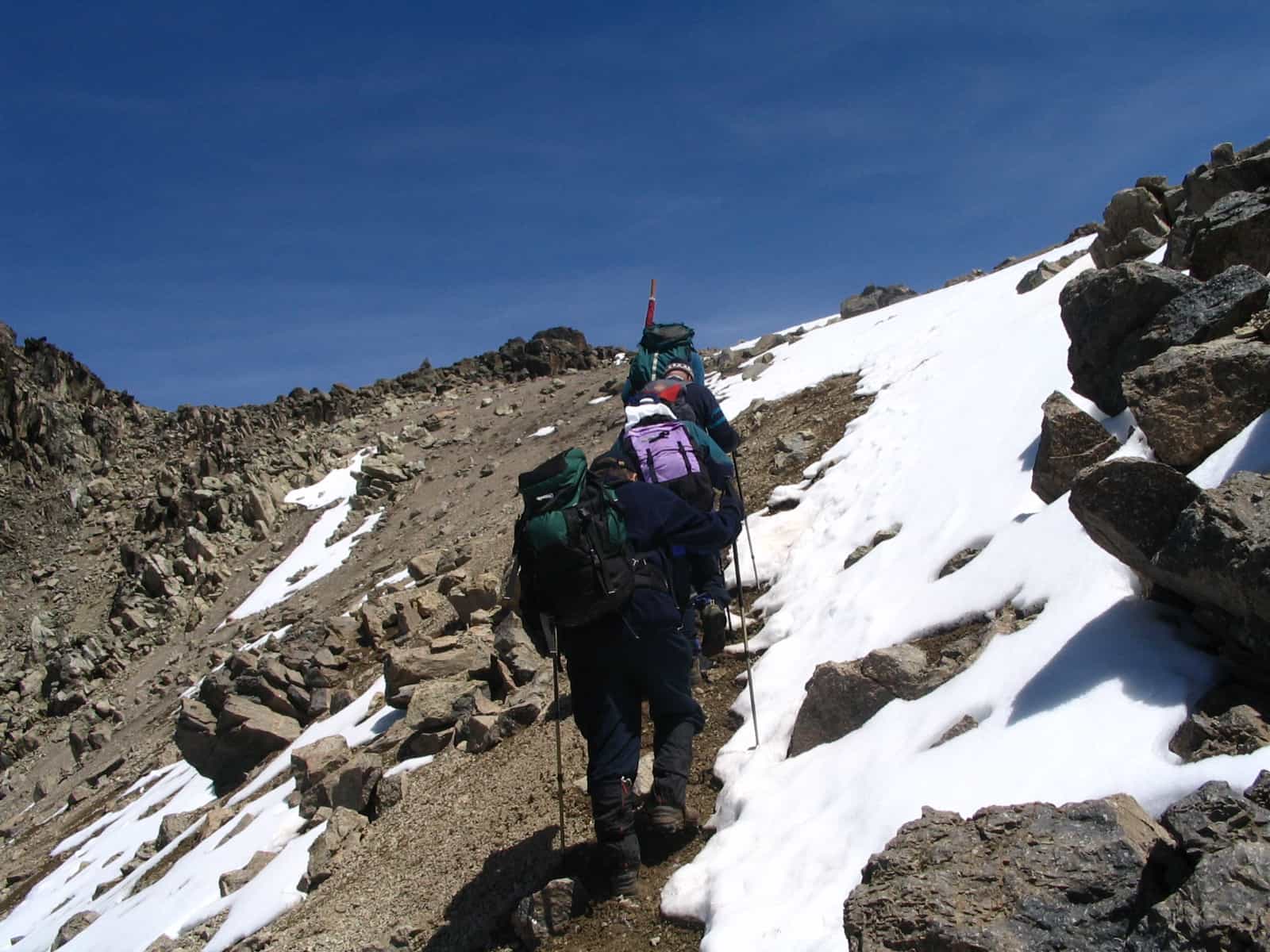
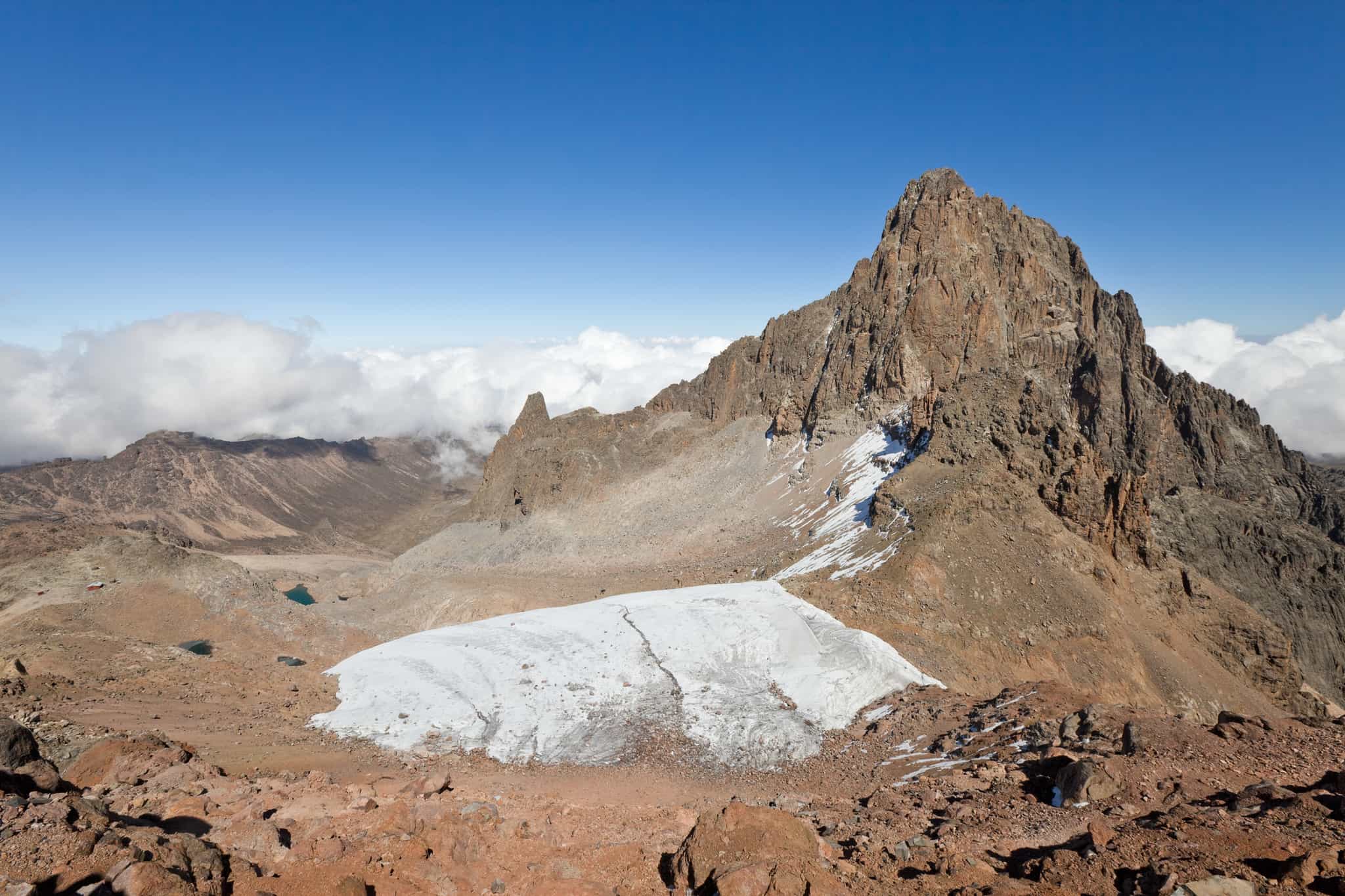

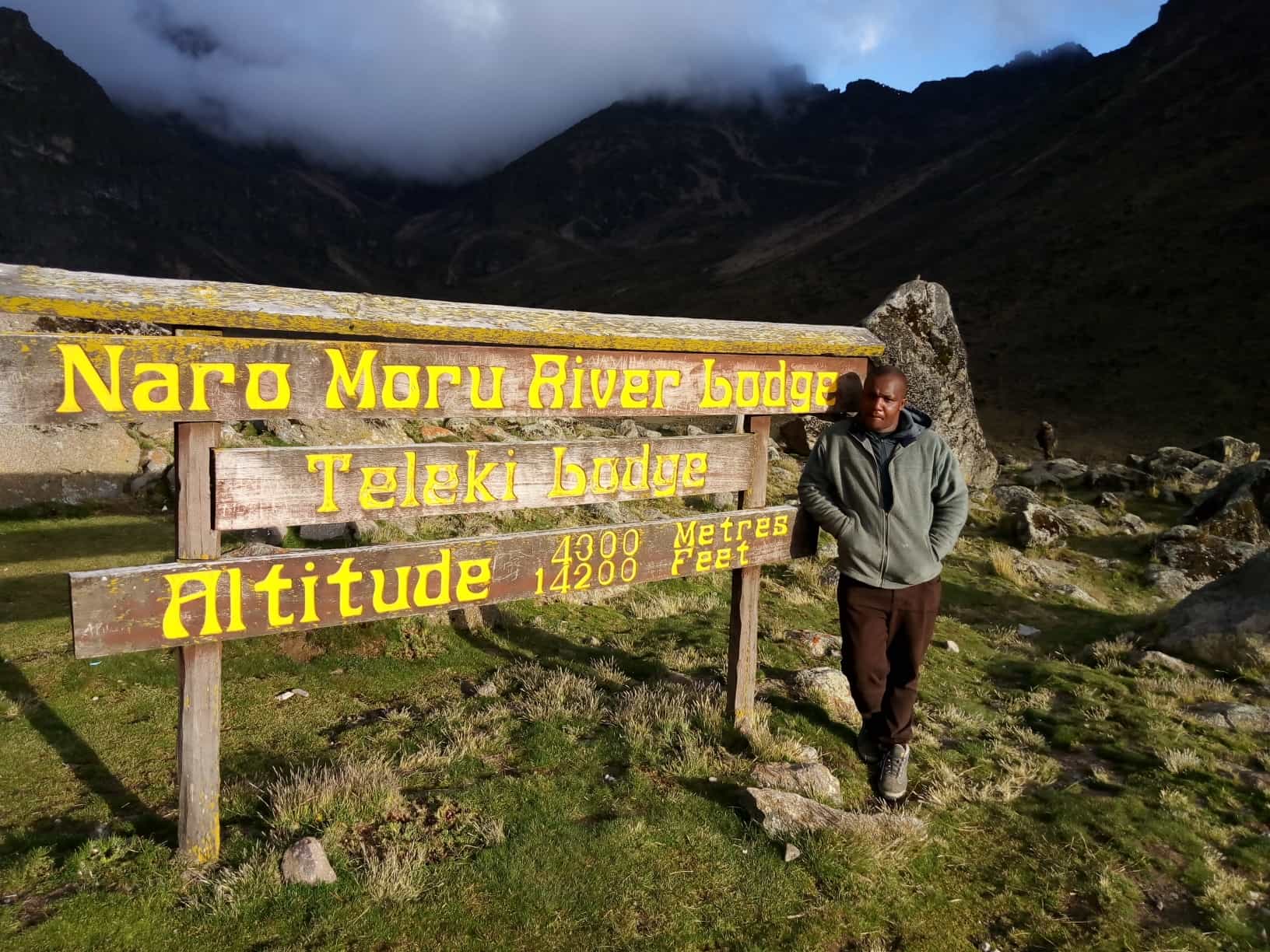
Summit at Point Lenana and be rewarded with the sunrise of a lifetime and views across the plains of Kenya
Traverse four ecosystems, from bamboo forests and alpine floral meadows to barren rock and lunar landscapes
Eyes peeled for elephant, buffalo, zebra, monkeys and higher up, the ubiquitous Mount Kenya rock hyrax
Key Information
Day 1
Karibu to Kenya
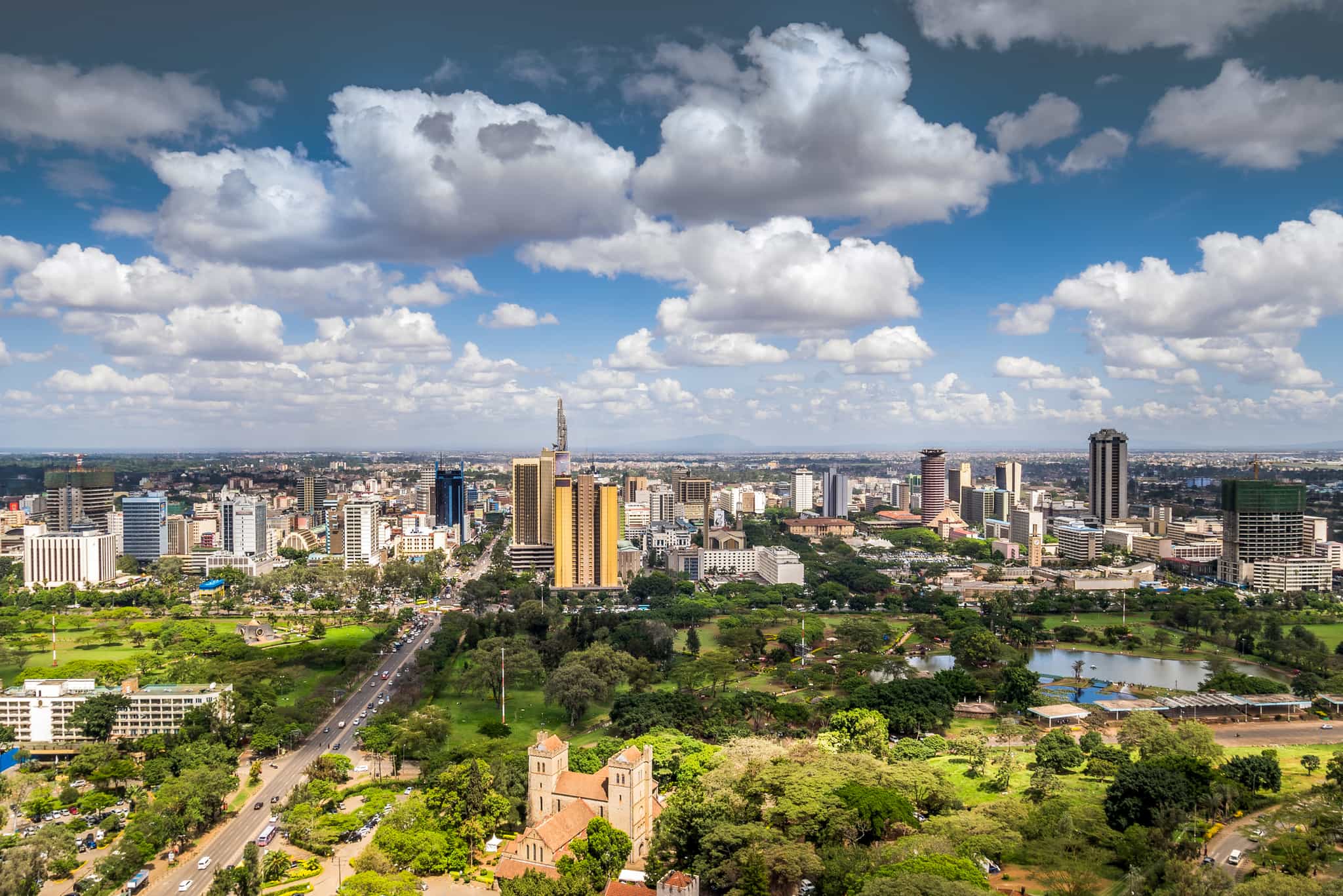
Your host will meet you at Nairobi Airport and transfer you to your accommodation. The rest of the day and evening are free to explore the city, depending on your arrival time. Retire for an early night so you're ready for tomorrow’s adventure.
Day 2
Slopes of Mount Kenya
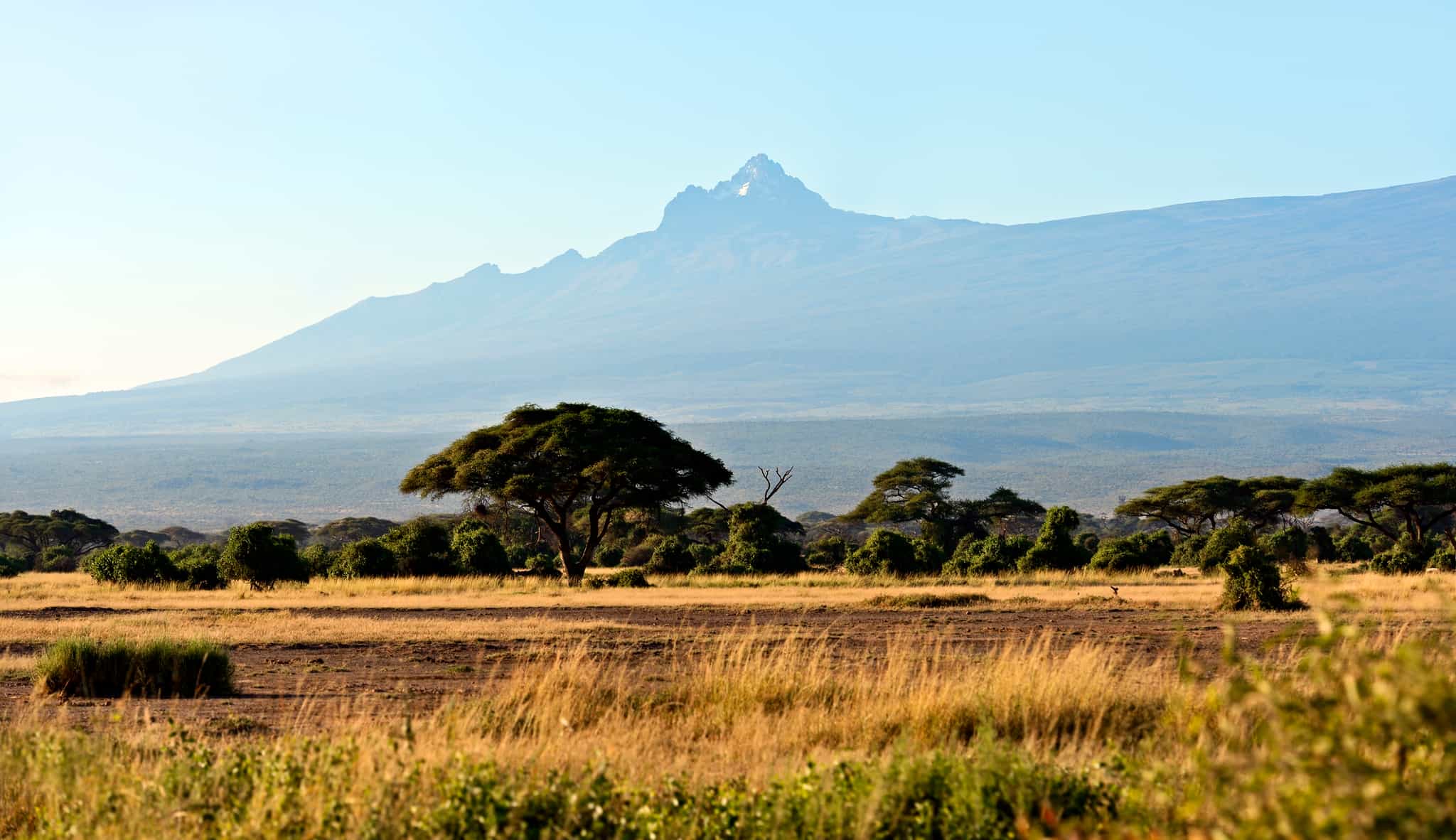
Driving
Wildlife Watching
After breakfast, you'll settle into the van for a road trip bound for the slopes of Mount Kenya - the starting point for your trekking adventure. Once settled into the lodge, stretch your legs with a walk exploring the local farms and villages of the Kikuyu. After a delicious dinner wander through the forest with a local natural history expert and learn about the medicinal plants, birds and animals found in this area before calling it a night.
Day 3
Old Moses Camp
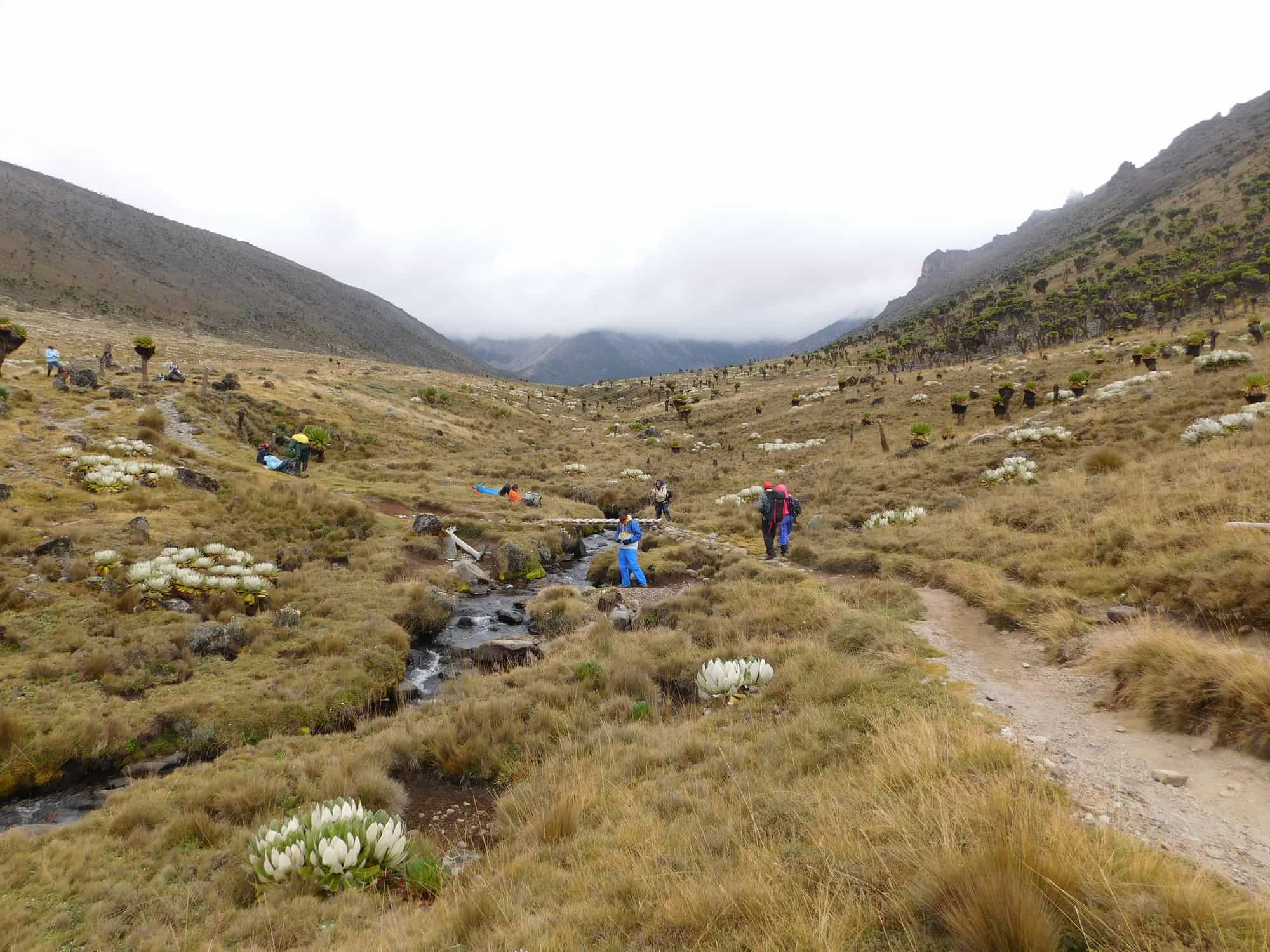
Hiking
After a briefing and equipment check, you'll take a short drive past the equator to the Sirimon Park Gate in Mount Kenya National Park, where your trek will begin. For your ascent of Mt Kenya, you'll take the Sirimon route, one of the longest, gentlest and most spectacular on the mountain. You'll pass through zones of dense forest, keeping an eye out for baboons and bushbuck. You'll hike through bamboo, giant heather zones and out onto high open moorland before reaching your campsite, where you'll settle in for the night.
Day 4
Shiptons Camp
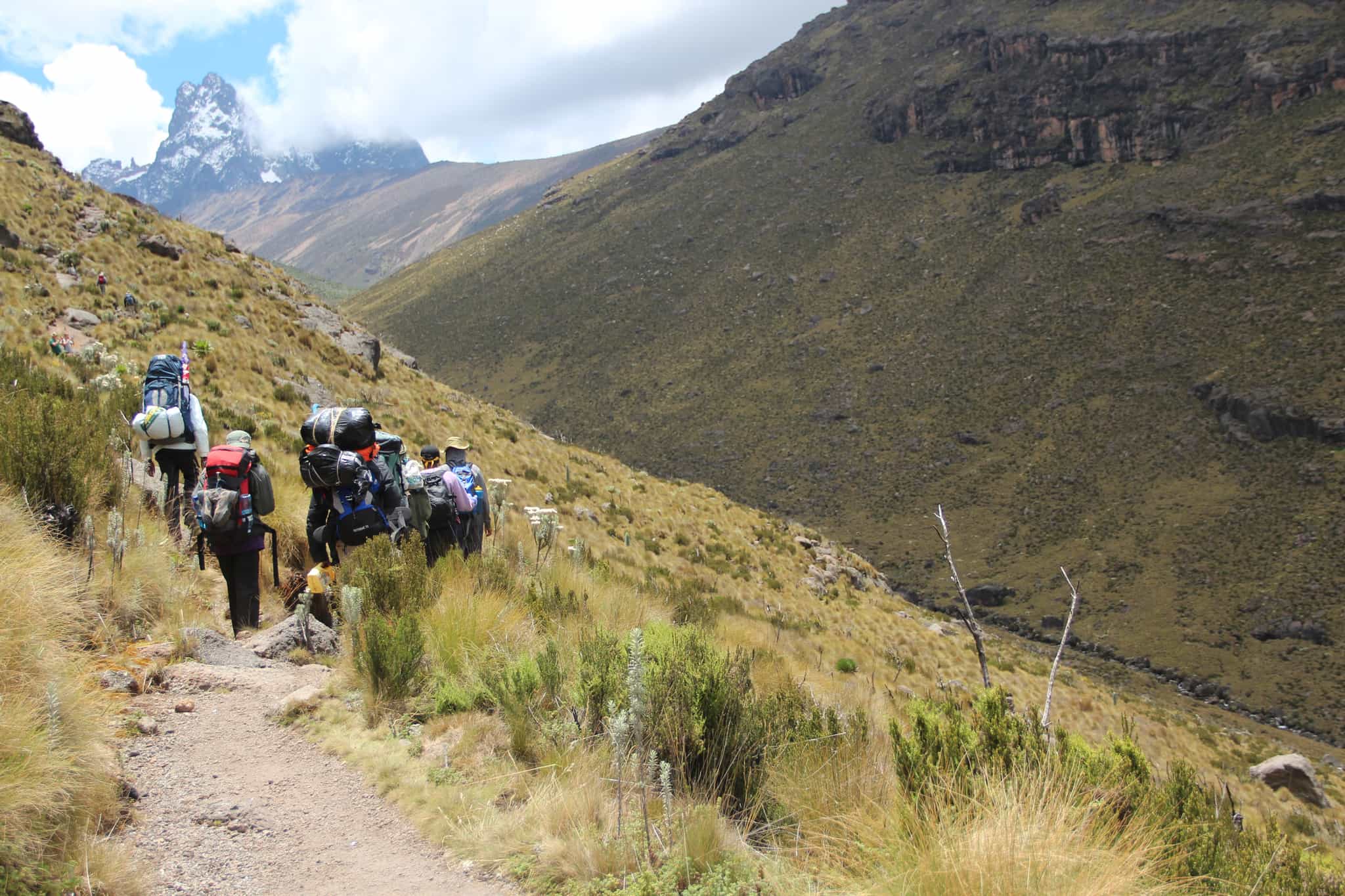
Hiking
Fuel up on an early breakfast before setting off across the alpine heath and moorland and traversing around a couple of streams and ridges before dropping into the MacKinder Valley. You'll have a hot lunch under a cave-like outcrop before continuing up the valley towards the main peaks. There is a short steeper section as you pass Shipton's Cave and then another as you arrive at Shipton's Camp, your base for the next two nights.
Day 5
Acclimatisation day
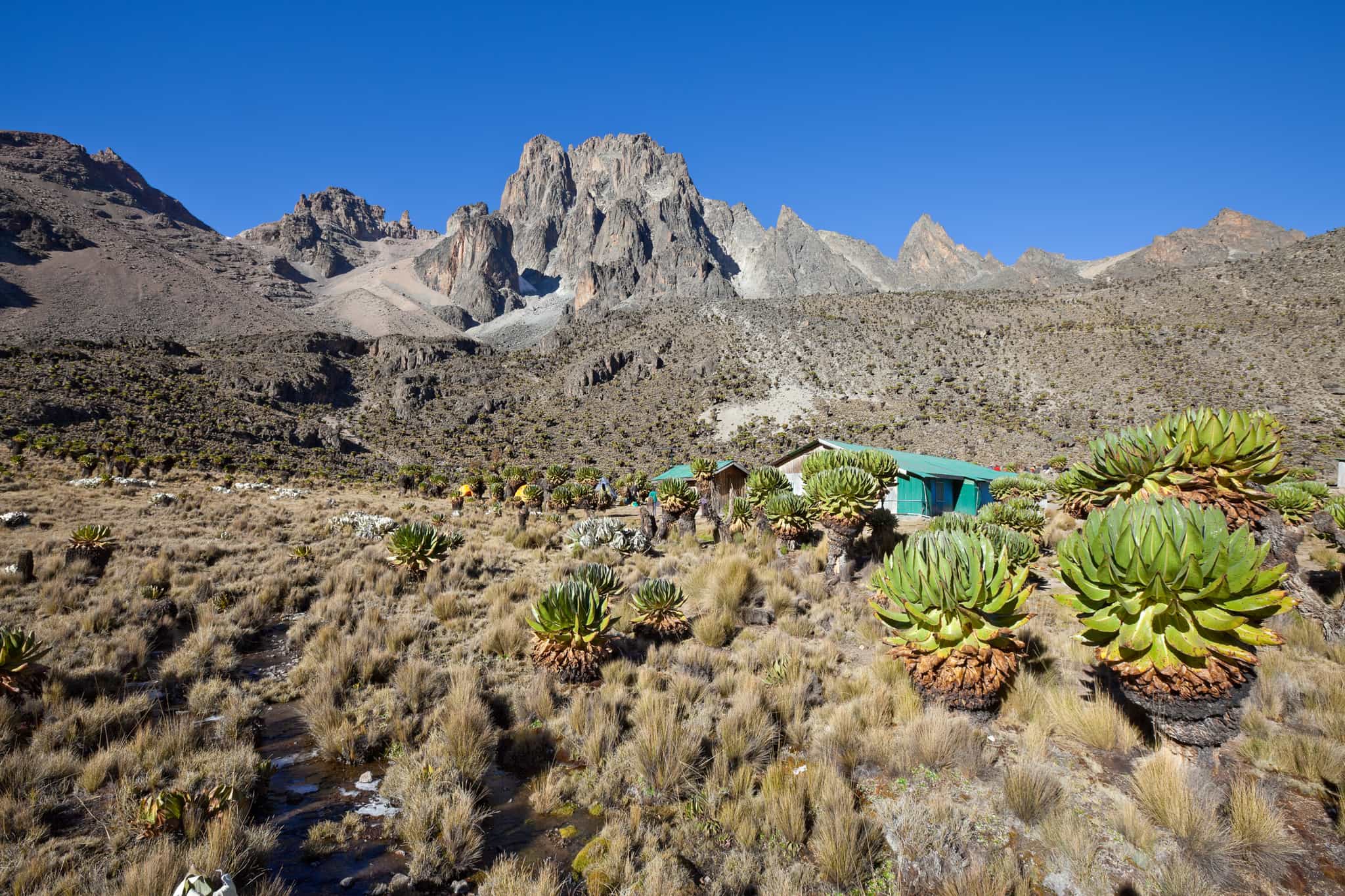
Hiking
Spend the day acclimatising as you explore the summit circuit trail up to the Hausberg (4,600m) and enjoy panoramic views of peaks Batian (5,199m) and Nelion (5,188m) and then descend back to your overnight camp at Shiptons. Have an early dinner, get yourself ready for the summit push in the morning and get some sleep. Nearly there!
Day 6
Summit day (4,985m)
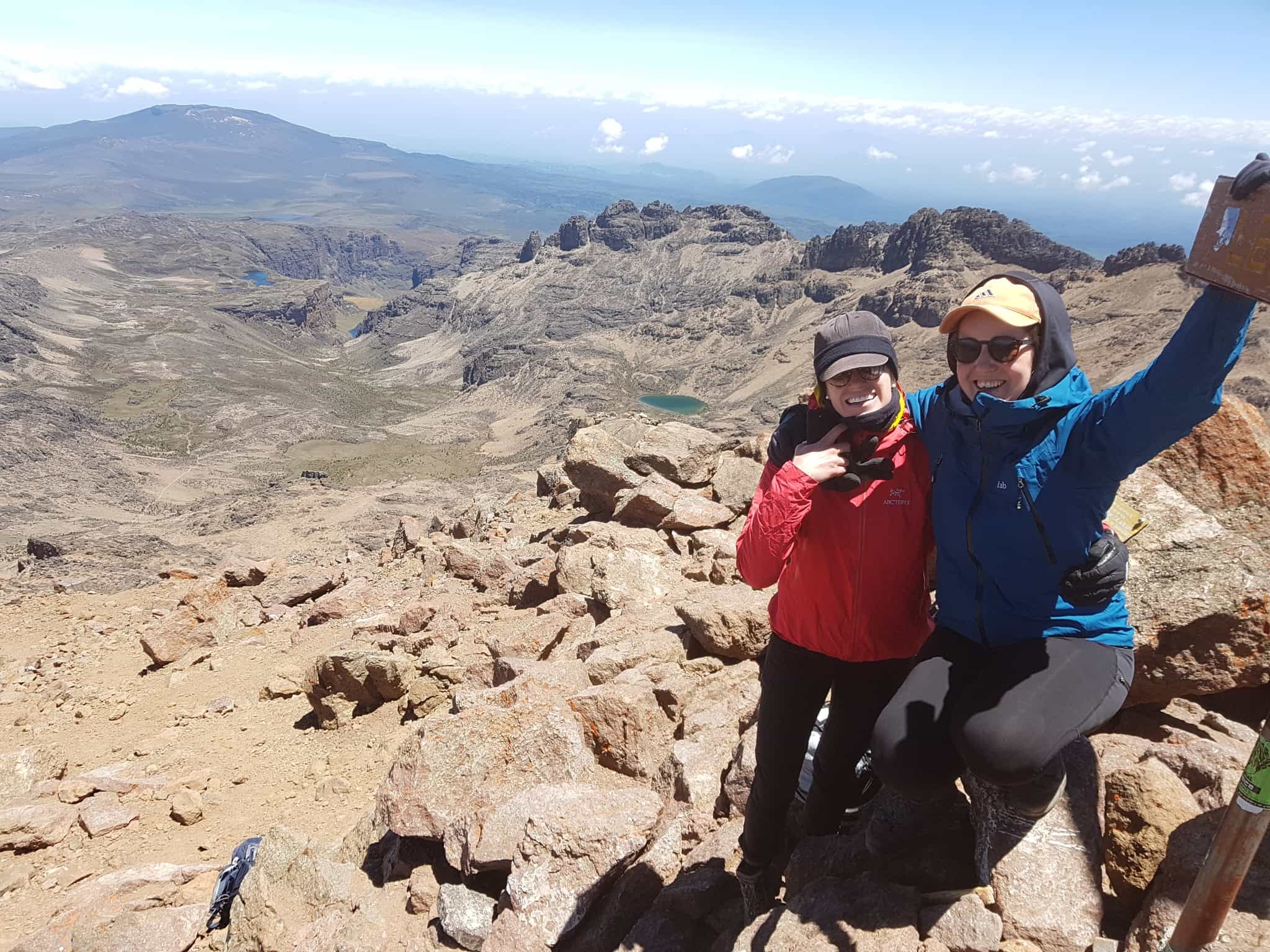
Hiking
Set off in the very early hours and begin the most physically and mentally challenging part of the trek, with the sole mission of getting to the summit point of Lenana Peak (4,985m) and possibly your greatest trekking accomplishment. After a rest, descend to the Mintos hut campsite for a well-earned breakfast before continuing your descent down the mountain to the final campsite where you'll have dinner and a good night’s rest.
Day 7
Final descent
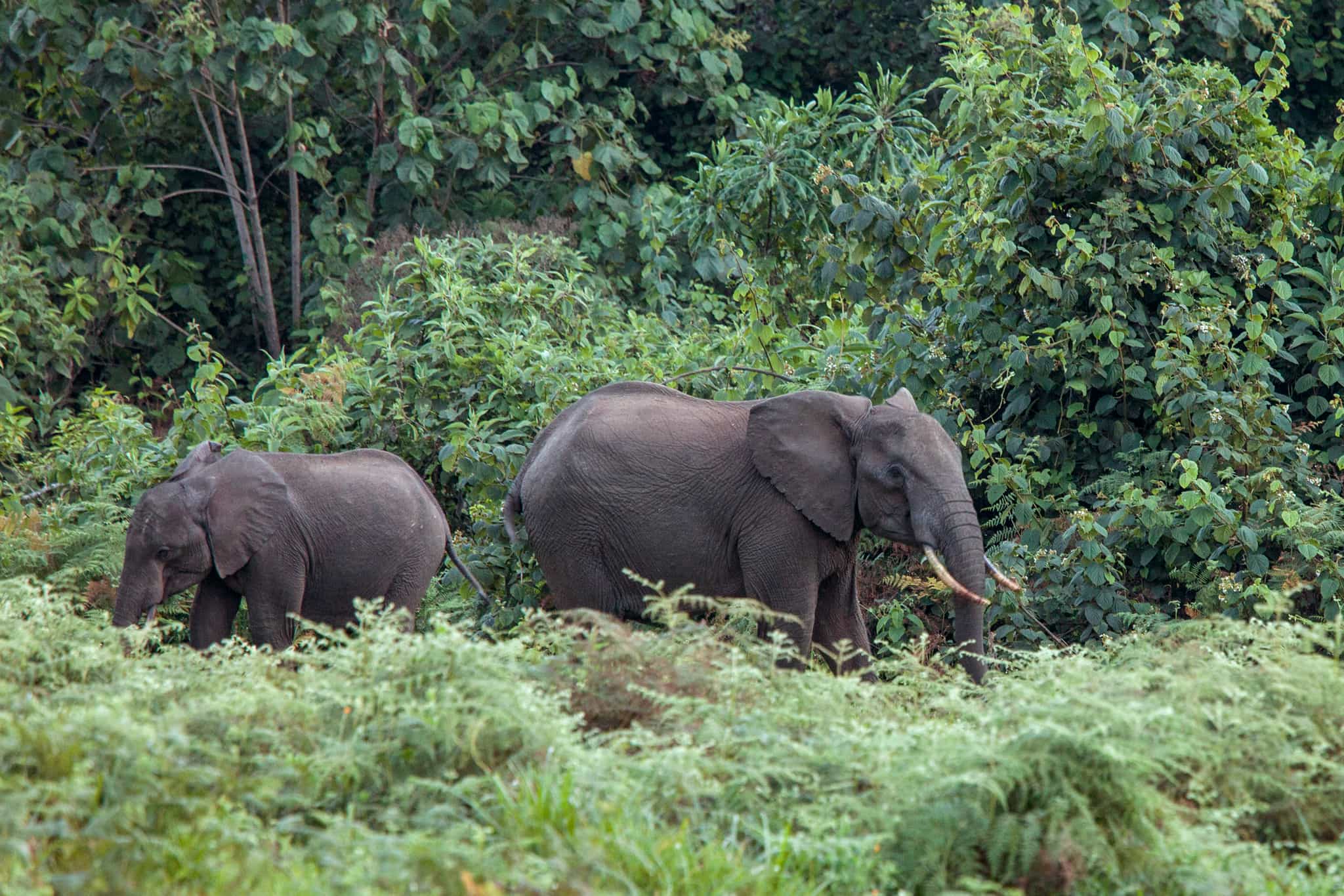
Hiking
Wildlife Watching
After a good night's sleep, continue your descent through the forest zone to the Meru Bandas cabins, run by Kenya Wildlife Service and where you can enjoy a hot shower and cold beer to celebrate your amazing accomplishment. Spend the afternoon wildlife watching, keeping your eyes peeled for large herds of elephants and buffalo wandering around the area. Continue the celebration over dinner with the rest of your team and receive your summit certificate, you've earned it.
Day 8
Journey back to Nairobi
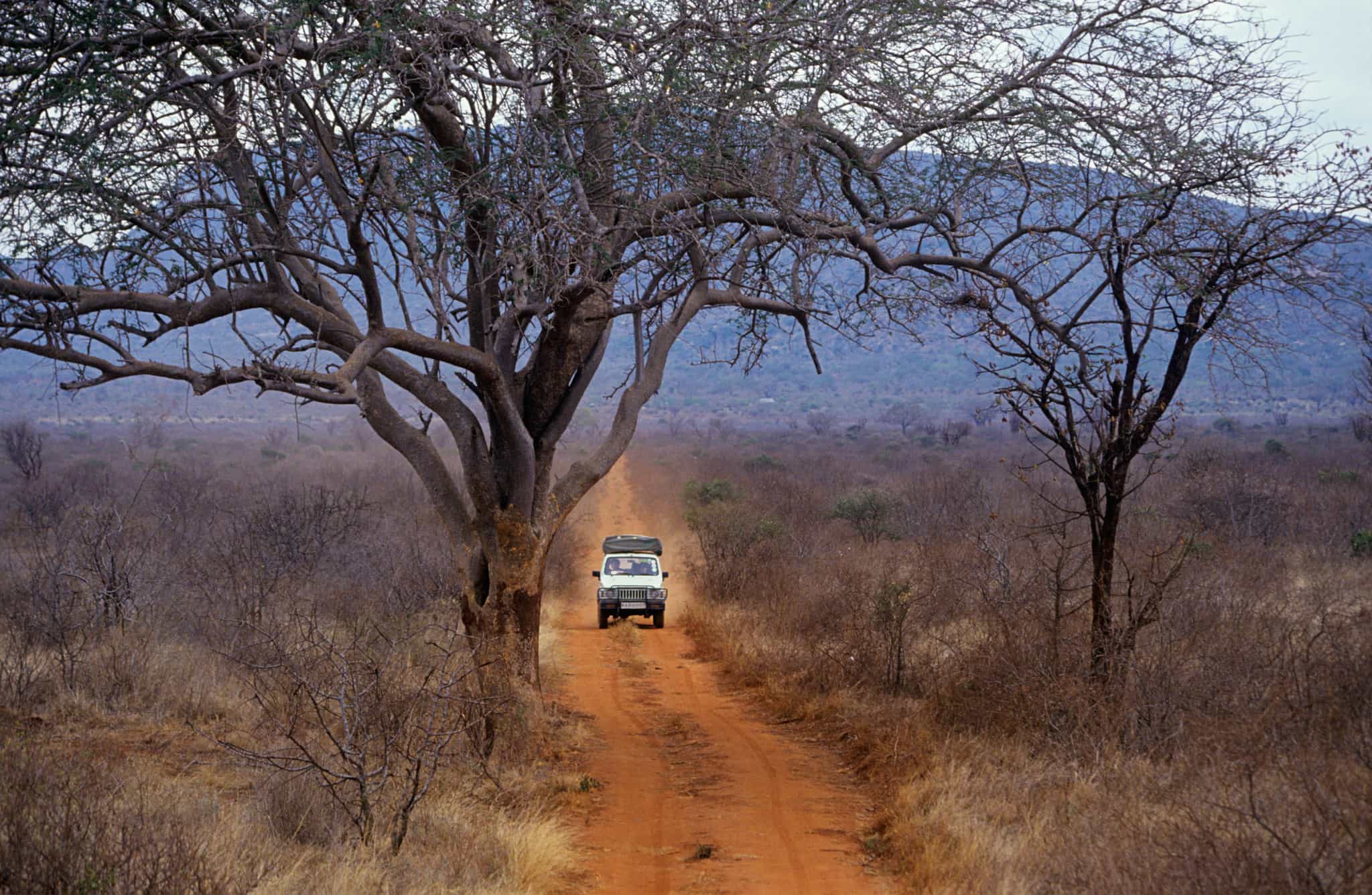
Driving
After breakfast, you'll start your journey by 4WD to the small town of Chogoria. Once here it's time to switch vehicles and say goodbye to the bumpy dirt roads for the final push back to Nairobi, the last stop on your Mount Kenya adventure. Celebrate your achievement in town over a few well-deserved local beers.
Day 9
Goodbye Kenya
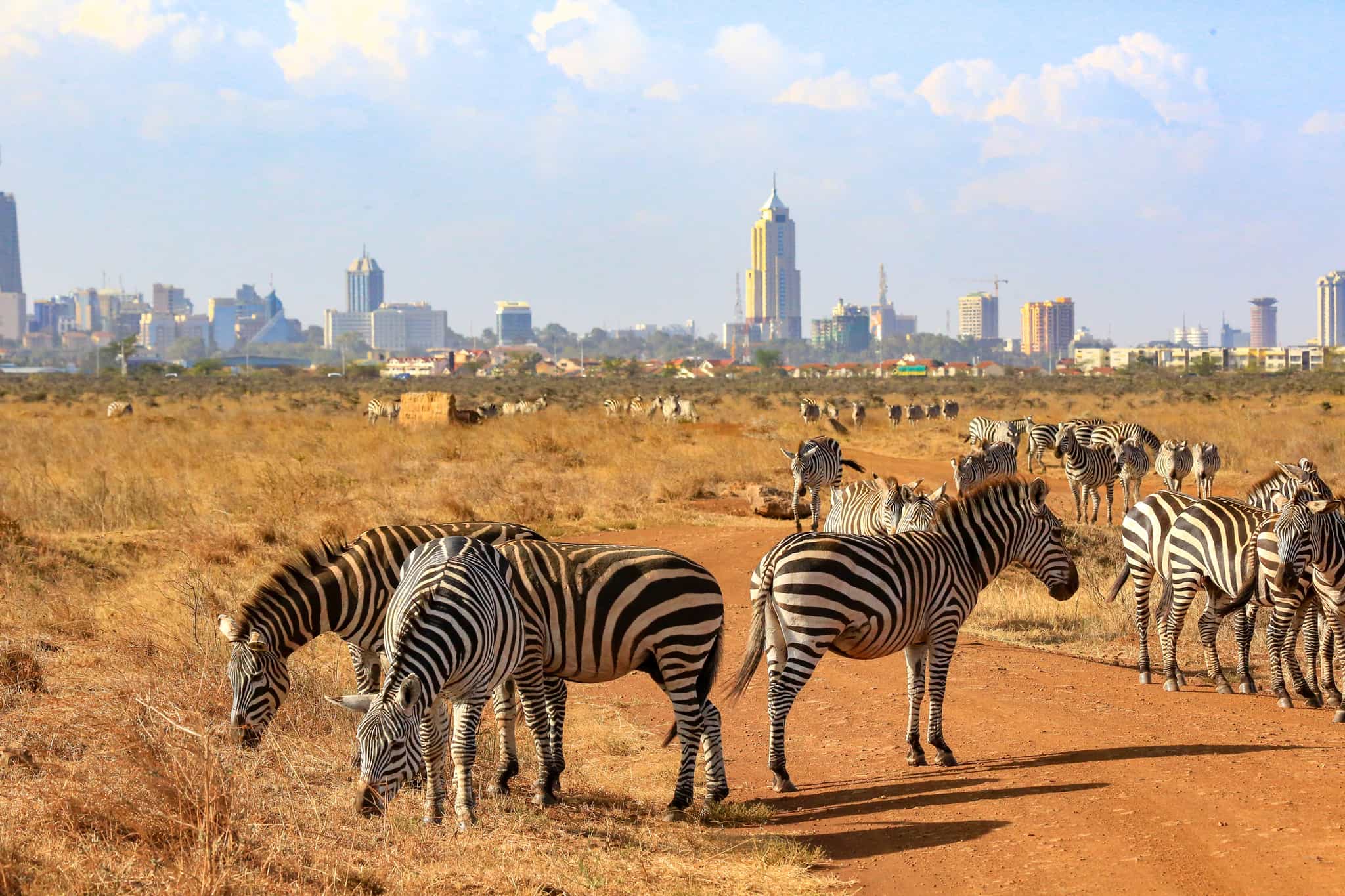
Enjoy a relaxed breakfast to mark the end of a remarkable trip and then head back to the airport or continue your adventure in Kenya.
The Area
Logistics
Starts
Jomo Kenyatta International Airport, Nairobi
Anytime on Day 1
Ends
Jomo Kenyatta International Airport, Nairobi
Anytime on Day 9
Transfers
Your adventure begins at Jomo Kenyatta International Airport (NBO) where your guide will be waiting for you in the arrivals area. Alternatively, if you’re already in Kenya, your host can arrange a pick-up from any point upon request (not included). On the final day, your host will transfer you from Nairobi back to Jomo Kenyatta International Airport (NBO), for any flight departing that day.
Travel options
There are frequent flights to Nairobi (NBO) from major airports across the UK, Europe and US.
Day 1
Breakfast
Lunch
Dinner
Day 2
Breakfast
Lunch
Dinner
Day 3 – Day 6
Breakfast
Lunch
Dinner
Day 7
Breakfast
Lunch
Dinner
Day 8
Breakfast
Lunch
Dinner
Day 9
Breakfast
Lunch
Dinner
What is the food like?
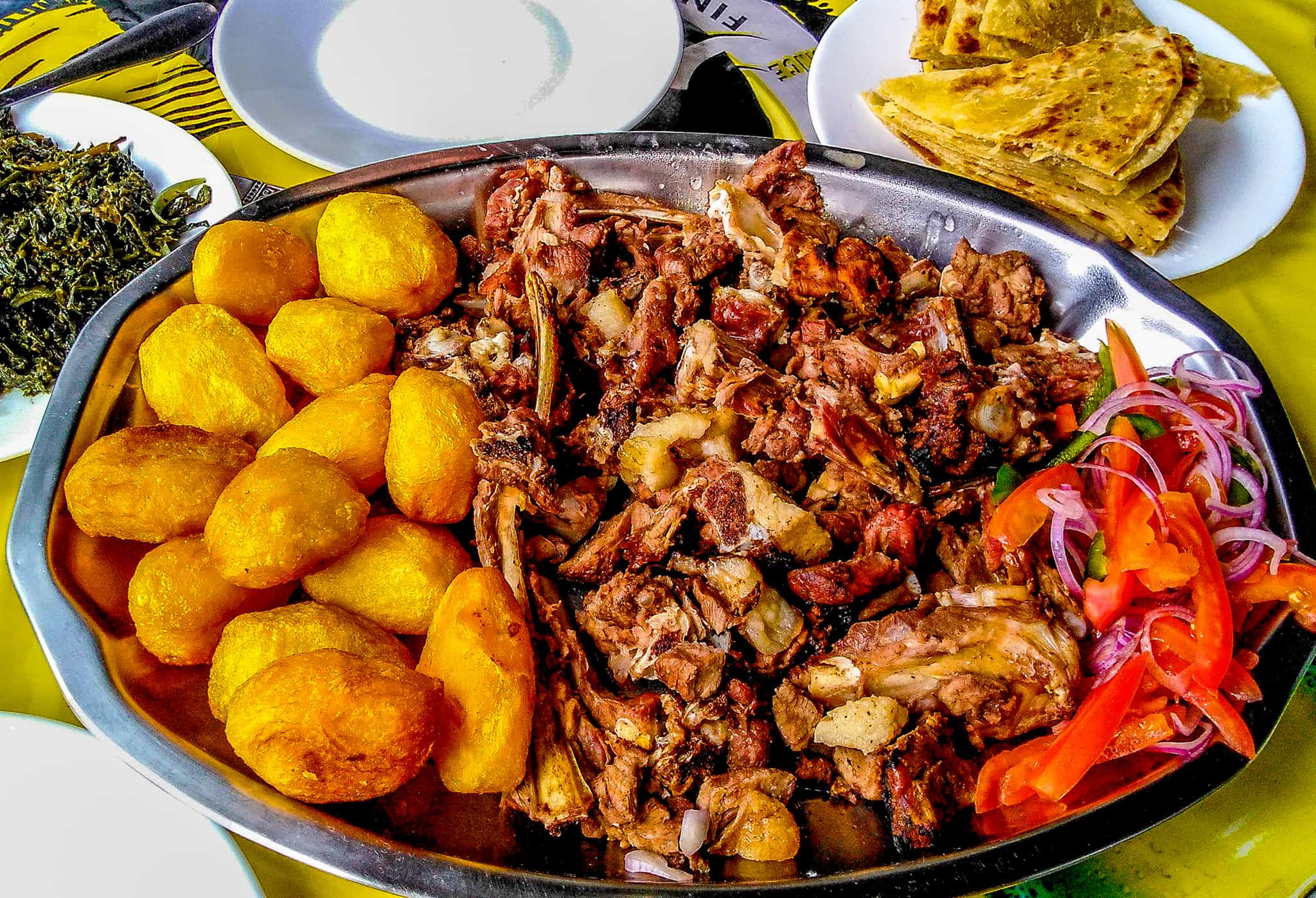
Throughout your trip, a team of experienced chefs will cook and serve you nutritious meals. Breakfast will usually be a combination of fruit, cereal, porridge, eggs, bread, French toast, pancakes, sausage, bacon, tea, coffee and hot chocolate. Lunch will be a mix of vegetables, fruit, boiled eggs, meat cutlets, various sandwiches (egg/cheese/tomato/tuna/meat/peanut butter), macaroni and meat sauce and bread. Dinner, meanwhile, will usually consist of soup, bread, salads, rice, pasta, potatoes, roast or fried chicken, beef or fish, curry, mixed vegetables, lentils, fruit salad and fruit with custard.
Vegetarians, vegans and other dietary requirements and allergies can be catered for - please just request on your passenger info form.
What is the accommodation like?
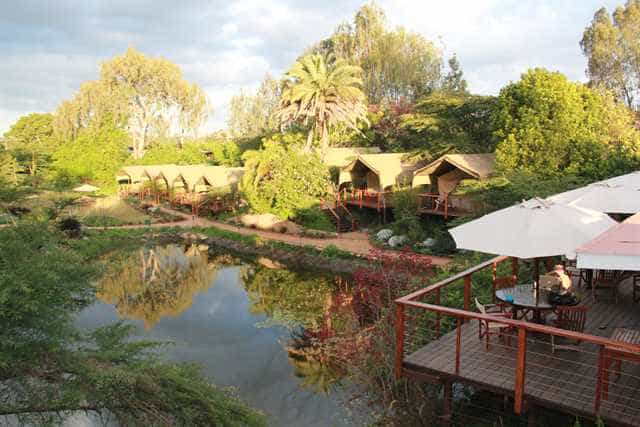
Nairobi
You'll spend your first and last nights in a twin-share safari tent at the Wildebeest Camp, an oasis in Nairobi. Conveniently positioned in beautiful Langata, you can enjoy the peaceful tropical gardens, which are home to hundreds of varieties of plants and birds, while still being close to shops, markets and restaurants.
Large, spacious and luxurious, these deluxe tents are a unique 'under-canvas' experience and a nice change to a regular hotel room. They are equipped with all the expected modern conveniences, including ensuite bathroom with solar-hot showers, basin and flush toilets – as well as 240v electricity.
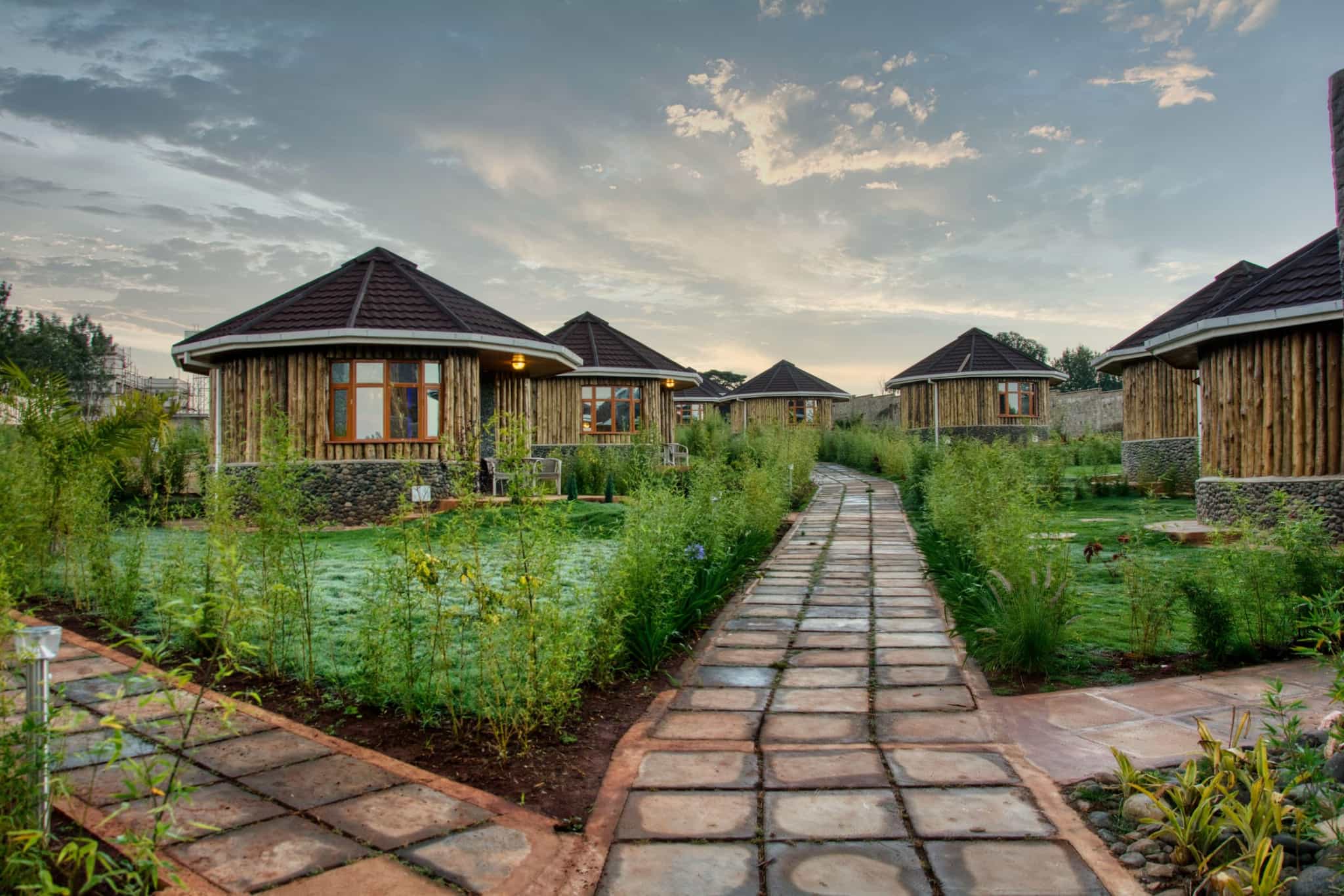
Nanyuki
You’ll spend a night in a twin-share room at the Aberdare Cottage and Lodge, Nanyuki. The property is located in the heart of the woodland savannah on the slopes of Mt Kenya. These cozy cottages promise comfort & serenity and the rooms have full ensuite with toilet, shower and bath and toiletries. The property also features a restaurant, outdoor swimming pool and provides a shared lounge and garden for relaxing and wildlife watching. After a good night sleep wake up to the wonderful sounds of singing birds and a breathtaking sunrise from the slopes of Mt. Kenya.
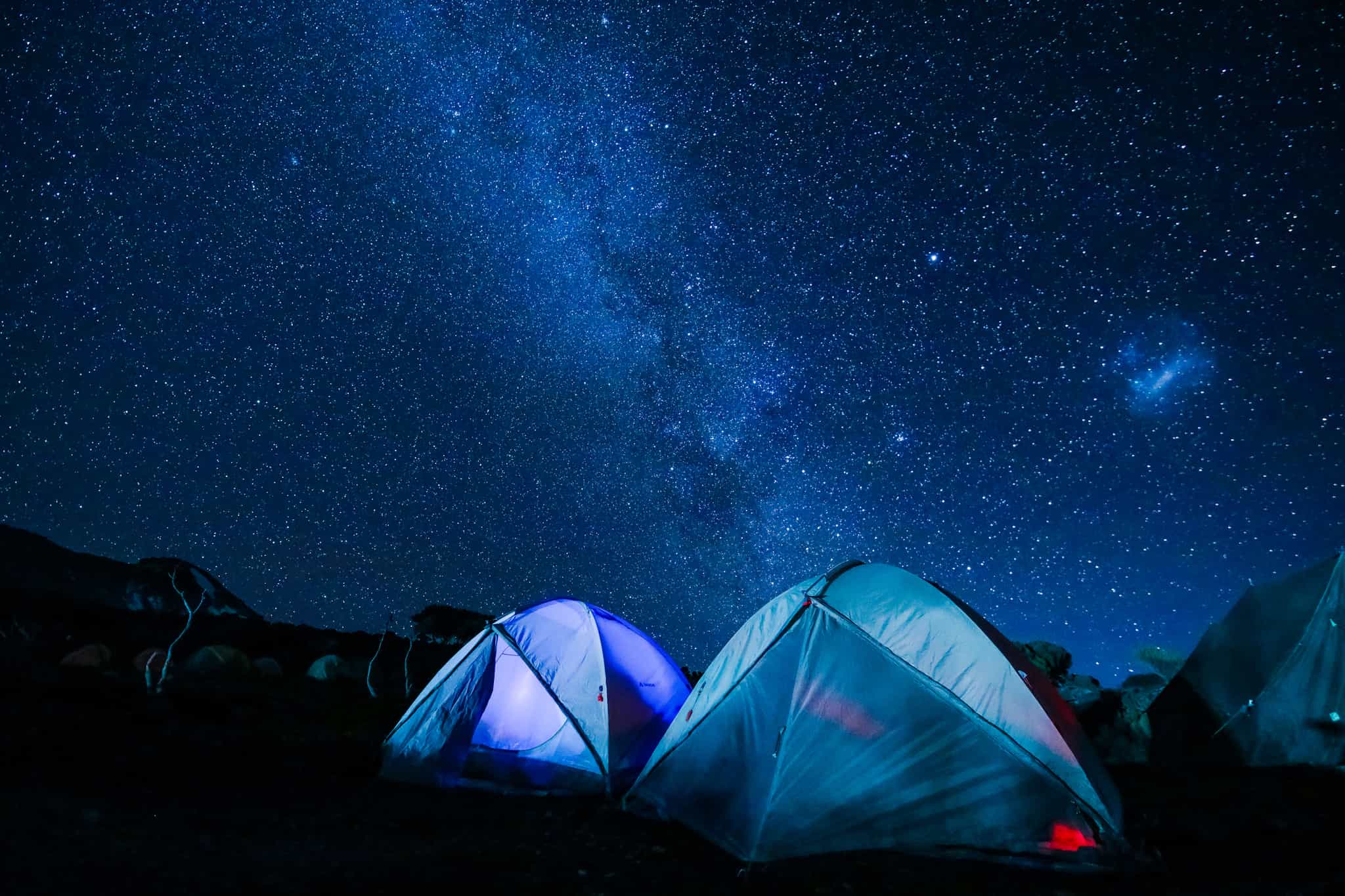
On the mountain
During the trek, you will camp at a number of sites along the Sirimon route in a twin-share tent.
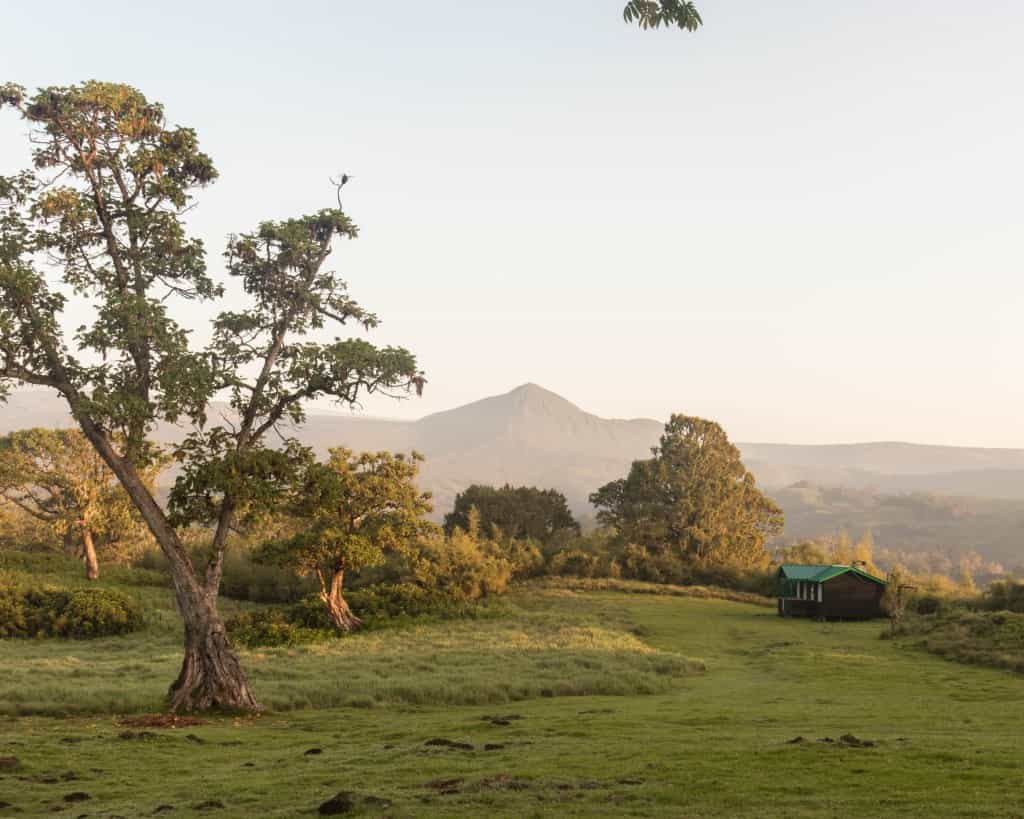
Meru Bandas
You’ll stay in a twin-share room at the Meru Bandas cabins, operated by Kenya Wildlife Service. Each cabin (banda) provides beds with clean sheets, blankets and towels. Hot water showers and a roaring fire are easily organised. A great variety of wildlife can be seen in the vicinity of the bandas, especially buffalo, elephants, bucks, antelopes and monkeys.
Upgrades
For solo travellers wanting their own space, there is the option to upgrade to a private room and tent throughout if you would like to do so. This is subject to availability and on some nights single rooms are limited so please request when you book if you would like to arrange this. See Optional Extras for prices.
We’re still waiting to collect any reviews from other travellers on this trip. However, all our hosts go through an extensive vetting process to ensure that your adventure is awesome.
Guides
Local, certified guide and support team
Accommodation
4 nights camping, 2 nights glamping, 1 in a cabin and 1 in a lodge
Meals
Munch on tasty food throughout
Transfers
To and from the airport and everything in-between
Porterage
A porter will carry your overnight luggage on the trek
Permits
All permits, taxes and licenses
Equipment
All your camping gear
Our trips are hassle-free by design. We include all the activities and equipment, as well as many of the meals, so you can simply rock up with your rucksack and share the adventure with your new pals.
Personal Expenses
You know your own spending habits best, so please budget an appropriate amount for things like optional meals and drinks, shopping, optional activities, and laundry.
What's included?
- All camping equipment
- Dining tents with a solar light
- All cooking equipment
What do I need to bring?
BAGS
Soft duffel bag or rucksack (porters to carry your equipment)
Daypack (25+ litres)
CLOTHES
Waterproof jacket
Lightweight down jacket
Waterproof trousers
Breathable wicking layers
Thermals (top and bottom, merino ideal)
Fleece or warm mid-layer
Lightweight trousers/shorts/skirts
T-shirts
Underwear & socks
Sunglasses
Sunhat
Winter hat
Gloves
Something to sleep in
Waterproof hiking boots (worn-in)
OTHER
Sleeping bag - warm, four season rated
Sleeping bag liner, for added warmth (optional)
Universal travel plug adapter
Power bank or solar charger
Passports (and visas)
Travel Insurance documents
Earplugs
Insect repellant
Suncream
Personal first-aid kit (inc. blister treatment)
Quick-dry towel
Alcohol hand-gel
Headtorch or torch
Reusable water bottle (x1 litre)
Biodegradable wet-wipes
Energy bars and snacks
Water purification tablets/treatment system
Trekking poles (highly recommended)
Pre/Post-trip accommodation in Nairobi (Single, Twin/Double)
Payable Before Departure
Pre/Post-trip accommodation in Nairobi (Single, Twin/Double)
… Per night
Optional Private Room Upgrade
Payable Before Departure
Optional Private Room Upgrade
… Per person
We partner with the World Land Trust to ensure this trip achieves Net-Zero emissions. We also support their Buy an Acre programme, helping local communities to buy and protect natural habitats in perpetuity.
What's the number?
It works out on average at 197kg of CO2 emissions per person, including all local transport, accommodation, food, activities, guides, staff and office operations.
The only thing it doesn’t include right now is flights and travel to the destination. We do make an overall estimate across all our customers separately, but as we don’t book flights, have customers from all corners of the world, and no way of reliably knowing their travel plans, we simply can’t include an individual number in the figure on display here. We’ve got a goal to fix that, so that when you book, there is a way to measure and mitigate the carbon emitted by your flight too.
But what does the number mean?
Yep, hard to picture eh? To give you an idea:
- Driving 1000 miles/1609km would be approximately 281kg of CO2 in an average car (or 140.5kg per person, if there were two of you in it).
- A return economy class flight between London and New York would be approximately 1619kg (1.66 tonnes) per person.
- 10 trees in a temperate forest are estimated to remove approximately 250kg of CO2 from the air in a period of 5-10 years.
What are we doing about it?
Our trips are relatively low-carbon by design, and we're working with all our hosts to develop long term carbon reduction plans. We partner with the World Land Trust to ensure this trip achieves Net-Zero emissions. We also support their Buy an Acre programme, helping local communities to buy and protect natural habitats in perpetuity, ensuring the protection of the reserve and its wildlife.
Want to know more?
Amazingly, no international travel company has ever publicly published their carbon measurements before, as far as we know. We believe that must change, quickly. So we’re openly sharing the method we used in the hope that other companies will be able to more easily follow suit and build on what we've done so far. You'll find it all here.
Guides have been extensively trained on the routes, terrain and conditions you'll be crossing. With over 10 years experience, they have also been to the summit more than 100 times. Additionally, all of the guides are certified First Aid Responders and CPR trained.
The mountain has three main summits - Batian (5199m), Nelion (5188m), and Point Lenana (4985m). Point Lenana is known as the 'trekkers summit' as is the only peak that is accessible without previous mountaineering experience. Both Bastian and Nelion summits involve multi-pitch trad rock climbing and are highly technical summits.
Yes, your host has long been campaigning for more responsible policies towards the employment of local people, including porters, and sharing the benefits of tourism more fairly with local communities. Your host ensures porters receive fair pay and ethical treatment.
Tips are not included in the trip cost, however, we would suggest the following per guest;
Guide: $15-20 per day Cook: $10 per day Porters: $10 per day
These are entirely at your discretion but the norm in Kenyan culture means there is an expectation to tip for good service.
There is a limit to the weight that the porters can carry and your kitbag must be no heavier than 20kg. You will also have a rucksack to hold your basic kit for the day. If you wish to bring more than 20kg it is best to arrange another bag and an extra porter charge will apply.
You can securely leave any excess luggage at your host's base before setting off on the trek.
No plastic bottles are allowed on Mount Kenya. Your guides will supply you with purified drinking water, either by boiling, filtration, or use of purification tablets. You should drink 4 to 6 litres of fluids per day.
Sure can! Over 70% of our travellers travel solo, it’s a great way to meet like-minded people.
Our team of Adventure Hunters co-create exclusive adventures which are run by highly vetted, specialist hosts. The trip is run by our trusted host partner in the destination. We only work with independent, local, in-destination experts who know the very best places to explore and how to stay safe. Read more information about the local teams we partner with. You’ll be introduced to the host straight after making a booking via the Much Better Adventures platform.
Much Better Adventures refer to the UK Government’s official travel advice when designing trips and monitoring trip operations. We recommend that all customers are familiar with the practical information provided on the Government’s FCDO website, where current travel advice can be found by searching for the applicable destination(s).
For customers joining this trip from other international destinations – please also read the official travel advice applicable to your country of residence/origin, as this may differ.
We recommend checking out the country-specific information and also talking to a travel nurse.
We automatically convert prices from the local currency that a host receives to your chosen currency. We update our exchange rates on a daily basis so this does mean that prices displayed on the site are subject to currency fluctuations, which is why you may see them change over time.
If you wish to change the currency you pay in, head to the bottom of the page.
All of our group adventures are specially designed for adults to enjoy as we want these adventures to bring together outdoorsy people who are truly like-minded. You must be over 18 to join one of our trips.
You're always in good company on one of our adventures.
Our trips are typically made up of a mixture of solo travellers and small groups of 2 or 3 friends, with most in their 30s-50s.
Our sociable adventures are solo-friendly by design and naturally attract outdoorsy people with a shared mindset; a love for adventure, a desire to push themselves and meet awesome, like-minded people along the way.
It’s this camaraderie that has so often turned a great adventure into a life-changing one.
Don't just take our word for it:
- 95% of people rate the group dynamics on our trips 5/5
- 90% of people recommend joining a trip to make new friends
- 75% of people have met people on our trips that they would now consider friends
See here for more info about the Much Better Adventures tribe.
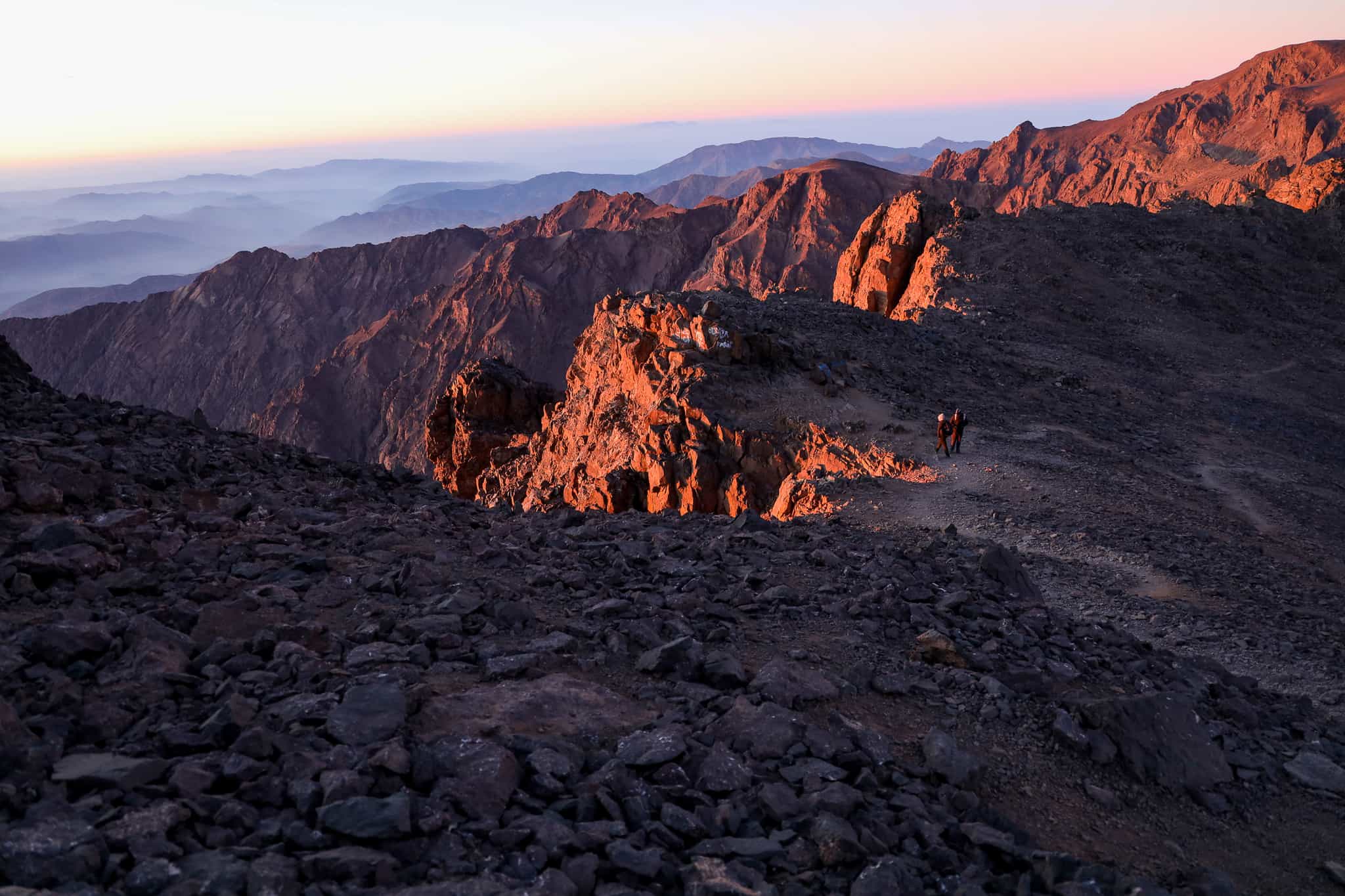
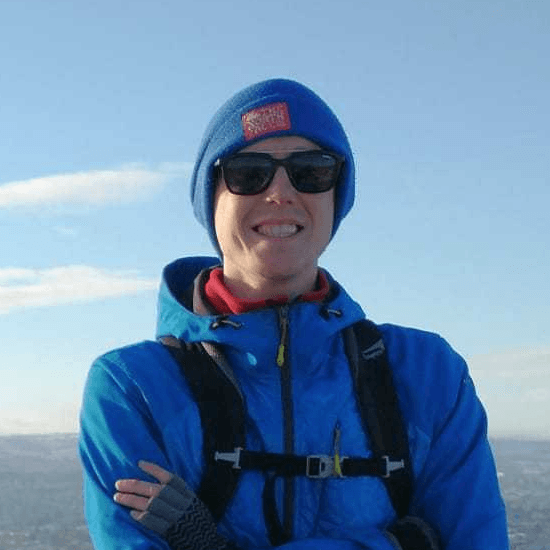
Need help finding flights?
From logistics and how to get there, to fitness, group dynamic and trip difficulty, Rory and his team of friendly experts are on hand to help.
We've got your back
Guaranteed to run
All Much Better Adventures trips are now guaranteed to run. Once you’ve booked your spot you can immediately make your travel arrangements, no uncertainty, no hanging about (excludes 'request to book' departures). Full details
Flexible payments
Secure your spot with the minimum deposit and pay off the remaining balance in as many instalments as you like, with no interest or fees. Full details
Happiness Guarantee
We’re so confident you’ll have an amazing time we’ll put our money on it. Full details
Full financial protection
To give you complete peace of mind Much Better Adventures is backed by ABTOT, ABTA and ATOL memberships. Full details
Tried & Trusted
Much Better Adventures is rated ‘Excellent’ on Trustpilot with over 1000 verified trip reviews averaging 4.8/5.
Connect before you go
You'll be invited to join a WhatsApp group to get to know each other before your big adventure together. Full details
DEPARTURE DATES
